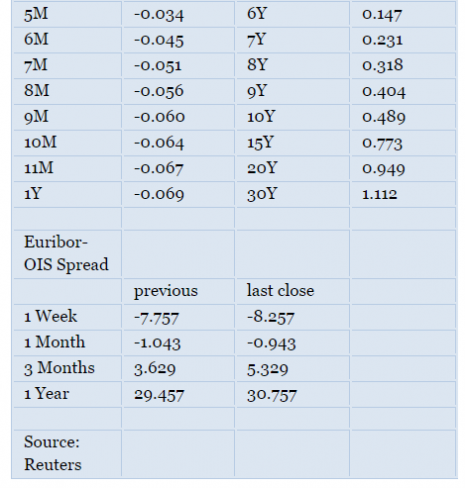after forming his coalition yesterday, Alexis Tsipras will present his cabinet today, with Yanis Varoufakis set to become the next finance minister and Independent Greeks leader Panos Kammenos defence minister;
The coalition deal with the Independent Greeks signals an uncompromising stance towards Greece’s lenders;
Independent Greeks support the key planks of Syriza’s Thessaloniki programme;
Kammenos gave green light to legislation already prepared, which is ready to go in a first blitz of legislative action by the new parliament;
the first bill raises the minimum wage back to €751 and reintroduces collective wage bargaining;
the second bill is on tax debt with new repayment plans, so that no more than 20%-30% of taxpayers’ annual income is used for repayment;
Other bills may be introduced later, include the end of the civil service mobility scheme and free electricity for poor households;
The primary surplus, meanwhile, shrunk last year, mainly due to revenues falling behind target;
Further News
The eurogroup gave a poker-faced response to the new Greek government – nothing changes, pacta sunt servanda;
officially Europe is a firmly opposed to a haircut, but is open to talks about other issues;
France sees its opportunity to become consensus seeker in Europe;
Wolfgang Munchau says a compromise should be easily achievable but this would require a shift in German policy, which he does not see;
Paul Krugman says that flows matter in the case of Greece, not stocks – the priority must be to get the primary surplus down;
Mark Schieritz agrees, and says Syriza would be ill-advised to insist on a haircut;
Reza Moghadam disagrees: there is no hope for Greece without a haircut and a cut in the required structural surplus;
We agree with Moghadam – stocks matter a lot because of the EU’s institutional arrangements;
Kevin O’Rourke says that if Syriza caves in to the EU, the Greeks would be voting for more radical anti-European parties next time;
Snap elections in Andalusia, Spain’s largest region, will set the tone for the confrontation between PSOE and Podemos over the rest of the year, and affect the PSOE’s internal leadership struggle;
Karl Whelan says it is far from clear that the ECB can direct an NCB to buy certain bonds, and if it can, it is far from clear whether it will use its powers;
The car rental company Sixt, meanwhile, says that despite QE it is still in a position to offer rental cars for under €1tr a piece;
Alexis Tsipras has been sworn in as the new prime minister and is to present his cabinet today, with Yanis Varoufakis set to become the next finance minister and Independent Greeks leader Panos Kammenos defence minister. Both Tsipras’ choice of the Independent Greeks as a coalition partner and the first bills in the pipeline suggest a bold move against the troika and the terms of the bailout agreement.
The alliance with the Independent Greeks is also a risky strategy for Tsipras, writes Macropolis, as the party is rabidly critical of Greece’s lenders and famously erratic. By opting for Kammenos as his coalition partner, the new Greek prime minister seems to be sending a message to lenders that he is not willing to compromise his position with regard to ending the bailout and securing debt relief. The risks are just too high for Tsipras, as he will have no one else to blame at home for any compromise he may have to strike with the EU lenders.
As for the coalition agreement, it was more straightforward than one would have thought. Sources told Kathimerini that the Independent Greeks agreed to back Syriza’s economic policies, as set out by Tsipras at the Thessaloniki International Fair in September, as long as the new prime minister does not forge ahead with changes in areas where Kammenos’s party has objections, including foreign policy issues and plans for a separation between the Church and state (Tsipras is the first prime minister to be been sworn in without a church ceremony).
Kammenos gave a green light for legislation already prepared. The first bill is to raise the minimum wage back to €751 and reintroduce regulations regarding collective wage bargaining, according to Kathimerini. The second draft law will focus on measures for taxpayers to be given better terms to repay overdue taxes and social security contributions. The bill foresees new payment plans, so that no more than 20%-30% of taxpayers’ annual income goes toward repaying their debts. The new government also wants to pass legislation that will end the mobility scheme and evaluation process in the civil service. This will lead to some people who have lost their jobs as a result of these measures being rehired. Other measures expected in the coming weeks are legislation that would allow some 300,000 households under the poverty threshold to receive free electricity. Tsipras is also due to push for the reopening of public broadcaster ERT, which was shut down in June 2013.
The latest data suggests that the primary surplus shrank by €1.7bn in December, according to Macropolis. The final figures for the whole year show that revenue (excluding tax refunds) fell short of target by €3.18bn, while expenditure was €769m better than target and the portfolio investment balance was €206m lower than expected. The revenue shortfall includes the €1.9bn income from SMP profits, which was not collected as the troika review was not concluded.
What to make of Syriza
The eurogroup is clearly not yet prepared for any of this. The new Greek finance minister was not yet present, and everybody stuck to their previous lines. Pacta sunt servanda. Greece has to abide by existing agreements. We spare you the specific quotes. We would like to urge readers to take all these comments with a grain of salt. Of course, the creditors would not signal any shift in their position ahead of a lengthy period of negotiations that lies ahead. More important is that they will negotiate in good faith. We are not so certain after we heard Wolfgang Schauble saying that nobody forces anyone into a programme: If Tsipras finds the money elsewhere, then good luck. While a lot of the comments should be seen as tactical posturing, the rejection of a haircut, however, seems to be non-negotiable, at least at this point. The article says the most probable path of action is a temporary extension of the current programme.
The French see this as an opportunity for France, with commentators rejoicing the fact that Syriza’s victory rattles on the dogma of the so-called Euro-liberalism. France might also try to redefine its political role of consensus-seeker in Europe. Several commentators spoke of a “historic responsibility” to reconcile Greece and Germany, southern and northern Europe, finds the Irish Times. As for the IMF, Christine Lagarde sounded uncompromising in an interview with Le Monde, saying “there are internal rules within the euro zone to be respected. We cannot make special categories for specific countries.”
The view from Berlin is more sceptical. FAZ quotes a government official as saying that it is going to be difficult if Tsipras does what he promises. In his Spiegel Online column Wolfgang Munchau writes that the situation is very dangerous. It is hard to see everybody meeting half way and still be able to pretend that they are true to their positions. The best outcome would be a shift in the German position. But years of ordoliberal indoctrination have dramatically raised the chance of a major accident. The German public and the media are not prepared for this. He said that a rational agreement should, in principle, be possible, the probability that one of the parties, or even both, miscalculate is very high.
Paul Krugman and several other commentators yesterday made the points that it is flows that matter, not stocks. The Greek debt stock looks high, but should not be a priority now since most of the debt is official. The real killer is austerity. Krugman does the multiplier math on what would happen if Greece were allowed to spend its entire €4.5bn primary surplus – the answer is a reduction in the unemployment rate by some 10pp.
Mark Schieritz makes the same point. The debt-to-GDP is irrelevant since the official debt does not need to be repaid until 2022. There are no interest rates on the EFSF credits, and the average interest rate on all loans is lower than Germany’s. Instead of focusing on debt, one should talk about the fiscal restrictions. He writes the Greeks would be ill advised to focus too much on the issue of debt relief.
Reza Moghadam says stocks matter. He says the best hope is for a quid-pro-quo deal – the EU should agree to halve Greek debt, and to halve the required fiscal balance, in exchange for structural reform. He says that Syriza may be more willing to accept reforms than the previous government.
It is worth reading Jamie Galbraith on all of this. He has been a co-author with Yanis Varoufakis, the new finance minister, and his views represent those of the Syriza administration on those points.
Kevin O’Rourke makes the broader point that the EU would be ill-advised to ignore the sentiment that is behind Syriza’s success.
“Syriza is opposed to European macroeconomic policy, and won the elections on that basis. They speak for lots of Eurozone voters, not just Greek ones. If the EU have any sense they will not play hardball with the new Greek government, especially since just about everyone agrees that Greece’s debt is unsustainable. Nor should anyone be hoping that the new Greek government will be “pragmatic”, and forget its opposition pledges once in government. The Greeks want fundamental change, and have voted for a democratic pro-European party to express that desire — which, you might think, is a lot more than the Troika deserves. If Syriza doesn’t deliver, for fear of upsetting its Eurozone partners, voters may turn to parties that really are anti-European. In the Greek context, that could be very ugly indeed. How the EU responds to last night’s election will tell us a lot about the actually existing European project.”
Stocks matter in this particular context because of the EU’s fiscal rules and the programme math. We understand the point about the present value of Greek debt, and the i/r moratorium until 2022. But without a write-off of debt, Greece will be forced to run much larger surpluses than what would be necessary after a haircut. Even when Greece were to exit the programme, the country would still need to abide by the EU’s fiscal rules. Getting from 175% to 60% of debt in 20 years requires much higher primary surpluses than getting there from 90%. So if you are serious about a lower primary surplus, don’t miss the level of debt. Much of this stocks-vs-flow debate is based on an ignorance of European political, legal and institutional settings.
The significance of early regional elections in Andalusia
The combination of QE and Greek elections has drowned the news of yet another early election in Spain which despite being limited to the Andalusian region could have national political implications.
The elections called by Andalusian PSOE leader and regional premier Susana Díaz will take place at the end of March, reported El Pais Monday, making them the first of four major election dates in Spain: local and regional elections in May, Catalan regional elections in September, and national elections on a date to be determined but by the end of the year. Andalusia is the largest region in the country by population and a traditional PSOE stronghold so the PSOE hopes to have a strong showing there to set the narrative for the year’s later elections.
If a good result by Susana Díaz in Andalusia were followed by a poor result in the regional elections in May, however, it would also give Díaz a strong platform to challenge Secretary General Pedro Sánchez in the party primary to be the lead candidate in the general election. It is easy to forget that the PSOE only elected a party leader and not a presidential election candidate in the internal party contest last July. El Diario has a timeline of the simmering conflict between Sánchez and Díaz. Reportedly the “old guard” of the party is displeased with Sánchez’s tenure as secretary general so far, and has begun manoeuvering to undermine him and install Díaz instead. Díaz, however, seems to dislike primaries and would prefer to be party leader “by acclamation”, writes Vozpópuli.
The PSOE also hopes to make Andalusia the first battleground to face Podemos, whose party structure is not well developed at the regional and local level, in particular in Andalusia where it will be forced to set up a campaign structure in just 2 months, writes El País. It appears unlikely that the region’s PP will repeat its good showing three years ago, and so the regional government will depend on the correlation of forces between PSOE, outgoing coalition party IU, and newcomer Podemos.
Whelan on QE
The debate on QE continues – but is mercifully shifting into some of the more technical issues – which are the ones that matter the most. Karl Whelan has produced the best summary on QE we have seen. He touches on all the issues, including how the 25% issue limit squares up with the 33% issuer limit, and at what point the a central bank asset purchase constitutes debt monetisation – the answer is when the central bank rolls over. One most interesting part to us is whether the ECB can actually force the NCB to buy their quote, or not, and if so, whether it will actually do so. Apparently, this is not so clear. Referring to Draghi’s answer at the presser, he writes:
“This still seems to me to fall short of saying that the ECB has decided to force an NCB to buy exact amounts of specific securities. Most likely I’m wrong and the Bundesbank is about to start buying very large amounts of German government bonds but it seems like there might just be the slightest amount of wiggle room here, e.g. the Bundesbank could decide to use its QE allocation just to buy covered bonds.”
Another important discussion point on which Whelan has strong views was the agreement on risk sharing. Whelan believes the agreement is actually quite good because it solves an important problem.
“If the bonds were shared around the Eurosystem, that would greatly increase the chance that the Governing Council would use its powers to act as a de facto senior creditor (as happened in Greece). All told, this is probably the safest realistic option for private creditors concerned about default risk.”
A potentially interesting side aspect is whether any ambiguity might give the Constitutional Court some leverage over the process. If there is any wiggle room, it could order the Bundesbank not to participate, or to use any freedom of manoeuvre.
QE causes hyperinflation after all












gennaio 28, 2015